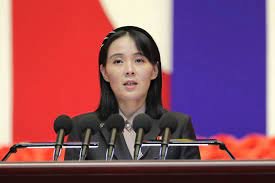Tensions on the Korean Peninsula:
Tensions on the Korean Peninsula have once again reached a boiling point as South Korea accuses North Korea of firing artillery shells near their tense sea boundary for the third consecutive day. The situation is exacerbated by the mocking statements from Kim Yo Jong, the influential sister of North Korean leader Kim Jong Un, who ridicules South’s ability to detect weapon launches. This article delves into the recent developments, explores the geopolitical context, and examines the potential consequences of the escalating animosities.
The Recent Incidents:
South Korea’s Joint Chiefs of Staff revealed that North Korea fired over 90 rounds near the disputed western sea boundary on Sunday, following more than 60 rounds on Saturday and over 200 shells the day before. The South Korean military vehemently urges North Korea to halt these provocative actions, cautioning of an imminent and forceful response. The recurring artillery firings intensify an already precarious situation, raising concerns about the stability of the region and the potential for further escalation.
Kim Yo Jong’s Mockery:
 In a statement conveyed through state media, Kim Yo Jong, the influential sister of North Korean leader Kim Jong Un, brushed aside South Korea’s apprehensions, asserting that North Korea’s actions on Saturday merely involved the detonation of blasting powder.
In a statement conveyed through state media, Kim Yo Jong, the influential sister of North Korean leader Kim Jong Un, brushed aside South Korea’s apprehensions, asserting that North Korea’s actions on Saturday merely involved the detonation of blasting powder.
She claimed it was a test aimed at evaluating the South Korean military’s detection capabilities. Dismissing South Korea’s response as “comedy-like, vulgar propaganda,” Kim Yo Jong derisively labeled their military as “blind persons” and “clowns in military uniforms.” This provocative rhetoric not only undermines South Korea’s credibility but also intensifies the already precarious situation on the Korean Peninsula. As tensions escalate, the exchange of inflammatory remarks threatens to further strain diplomatic efforts and heighten the risk of miscalculation, exacerbating the potential for conflict in the region.
Potential Consequences:
The animosities between North and South Korea have been escalating due to North Korea’s continuous missile tests since 2022 and South Korea’s increased military training with the United States. The recent artillery firings have prompted South Korea to conduct its own firing exercises, breaching a 2018 military agreement intended to ease front-line military tensions. As a result, the agreement is now at risk of collapsing, further intensifying the potential for conflict.
Geopolitical Context:
Experts suggest that North Korea’s recent provocations could be a strategic move ahead of South Korea’s parliamentary elections in April and the U.S. presidential elections in November. Kim Jong Un may be attempting to bolster his weapons arsenal to gain more concessions during future diplomatic negotiations. The ongoing tit-for-tat cycle between South and North Korea contributes to an unstable geopolitical landscape in the region.
Kim Yo Jong’s Political Maneuvering:
Kim Yo Jong’s recent statements, particularly labeling South Korea’s military as “gangsters” and “clowns,” suggest a deliberate effort to influence South Korean politics. Her previous comments on President Yoon Suk Yeol and his predecessor Moon Jae-in indicate a nuanced approach to shaping public opinion ahead of the upcoming elections. Analysts believe that Kim Yo Jong’s rhetoric is aimed at supporting candidates aligned with a more lenient approach towards North Korea.
The Fragile 2018 Military Agreement:
The 2018 military agreement between North and South Korea was intended to ease tensions by halting live-fire exercises and other hostile acts along their border. However, recent events demonstrate the fragility of this agreement, with both sides breaching its terms. The breakdown of this accord further complicates the prospects for peaceful resolution on the Korean Peninsula.
Firing Between North and South Korea raise Concerns:
The recent artillery firings and escalating tensions between North and South Korea raise concerns about the stability of the region. As both countries engage in provocative actions, the risk of accidental clashes and a potential military conflict looms large. The geopolitical dynamics, combined with Kim Jong Un’s strategic maneuvering and Kim Yo Jong’s political influence, underscore the complexity of the situation. The international community must closely monitor these developments and work towards diplomatic solutions to prevent further escalation on the Korean Peninsula.













Comments 1